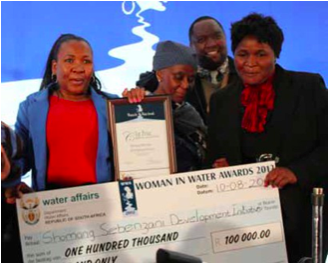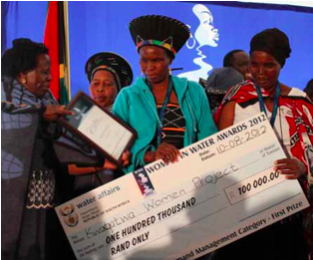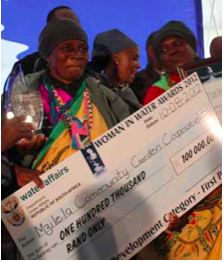Honouring women who conserve and use water productively
Honouring women who conserve and use water productively sadmin
Photo caption: Shomang Sebenzani Development Initiative – Gauteng

Photo caption: KwaQatha Women Project- KwaZulu-Natal

Photo caption: Mzilela Community Garden Cooperative – Limpopo
South Africa is set for a massive boost in science with the recent announcement that the country – together with eight African partner nations – will host the majority of the Square Kilometre Array (SKA) telescope project.
The Department of Water Affairs honoured women using water to improve their respective communities in the 2012 Women in Water Awards held in the Makwane Village in Qwaqwa, in the Free State, recently.
The awards recognise the exceptional work done by women and the vital role they play in the water sector. Through perseverance, under difficult conditions and with few resources, these women have implemented creative and innovative new ways to save water through their projects.
Twelve projects received prizes this year in four cat egories:
Adopt a River
The project sees women from various communities rallying together to beautify their villages by cleaning surrounding rivers. Developing communities also use the water for domestic purposes, commercial farming, vegetable gardening and rehabilitation of groundwater sources as well as the rehabilitation of wetlands.
1st prize: Shomang Sebenzani Development Initiative – Gauteng
This initiative employs 100 women who facilitate the cleaning of the Jukskei River around Alexandra. It is a non-profit organisation founded in 2001. The project plays an important role in educating the community about the importance of water and its use. The initiative received R100 000 in prize money.
2nd prize: Eyami Eyakho Cleaning Services – KwaZulu-Natal
The project, which employs 40 women, promotes the planting of trees in communities to beautify their surroundings. The initiative received R50 000 in prize money.
3rd prize: Setsoto Women Empowerment – Free State
This is a women empowerment project engaged in cleaning the Caledon River, also known as the Mohokare River, which is a tributary of Orange River. The project employs 36 women. The initiative received R20 000 in prize money.
Education and Awareness
These projects share water-related information with communities in community gatherings. They advocate for proper use of water and teach communities the effectiveness of harvesting rain water.
1st prize: Khiphikhono Organisation for the Disabled – KwaZulu-Natal
It is an initiative that ensures that women with disabilities have access to clean water and can also access water for their vegetable gardens in order to alleviate poverty in the community. The project, which employs 16 women, received R100 000 in prize money.
2nd prize: Nababeep Advice and Development Centre – Northern Cape
The project employs 10 women mainly to educate learners and the community on how to save water and how to clean riversides. The community is also educated on the use of grey water. Grey water is wastewater generated from activities at home, such as laundry, dish- washing and bathing, which can be recycled for uses such as irrigation. The initiative received R50 000 in prize money.
3rd prize: Lee-Anne Klapmuts Water Project
It does not take a big group to make a difference in a community. Four hard-working women have managed to keep this project afloat successfully. The project collects runoff water that is then stored in self-made containers and plastic bottles for agricultural and domestic use. Runoff water is excess water that flows over the land, especially after rain. The initiative received R20 000 in prize money.
Water conservation
These projects use very little water in their production of cash crops. Some even have their own regional way of recycling grey water in their gardens. They conserve water by creating river basins, growing indigenous plants and removing those that absorb too much water.
1st prize: KwaQatha Women Project- KwaZulu-Natal
The hands of 20 women in this vegetable gardening initiative scooped the top award in the Water Conservation category. The project uses grey water and plastic two-litre bottles to store water and water their crops. The initiative received R100 000 in prize money.
2nd prize: Water for Food Harvesting – Eastern Cape
Seventeen women in the Eastern Cape man- age this vegetable gardening project. By using rainwater harvested into artificially made dams and by using compost instead of fertilisers, the group carries out mulching – a method of keeping the soil moist and ready for harvesting. The initiative received R50 000 in prize money.
3rd prize: Ikaheng Maafrika Project – Free State
With only eight pairs of hands, the project grows plantations using water abstracted from an artificial dam. The women irrigate the land in the early hours of the morning and in the late evening by using a drip irrigation system. The initiative received R20 000 in prize money.
Community development
Through these water-related projects, com- munities have developed and produced food, shared food with surrounding poor families and donated food during times of mourning to poor community members. The women took it upon themselves to manage the one and only borehole which serves as a source of water.
1st prize: Mzilela Community Garden Cooperative – Limpopo
This is a vegetable gardening project initiated during the time when the community was faced with serious health problems, particularly malnutrition. It employs and supports 16 women who in turn are able to support their own families. Scooping first place, the initiative received R100 000 in prize money.
2nd prize: Retshwenyegile Home-based Care – North West
Also a vegetable gardening project managed by 16 women, the project sees to the planting of its own seedlings. The women also carry out transplantation each evening, to ensure seedlings are still equipped for growth at night as well. The initiative received R50 000 in prize money.
3rd prize: Moshate Borehole Project – Limpopo
This is one of the largest projects and employs 196 women. The borehole water project was established when the community of Ntoane in Moutse was experiencing a serious water shortage. The women are now responsible for storing water for the community and seasonal harvests. The initiative received R20 000 in prize money.